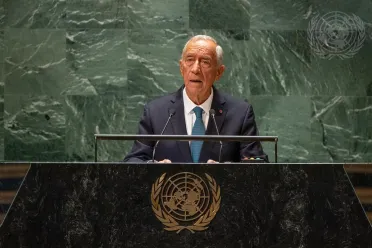Statement
Statement summary
MARCELO REBELO DE SOUSA, President of Portugal, reaffirmed his country’s commitment to the priorities of the United Nations. Most notably he cited climate change, human rights, migrants, refugees and gender equality. Portugal also supports the success of the Summit of the Future in 2024, the United Nations Alliance of Civilizations Forum, which the country will host in 2024, and a world social summit in 2025. He highlighted the three main interconnected urgencies in today’s world — the need to respect the Charter of the United Nations; accelerate the fight against climate change to fulfil the objectives of 2030 Agenda; and reform international institutions. Some of these institutions were formed in the last century and do not correspond to the current realities, he observed.
On the indivisibility of these priorities, he argued that without respect for the Charter there cannot be peace, sustainable development or institutional reform. There is no sustainable development, nor respect for the Charter, without the reform of international institutions. And there is no reform without respect for the Charter and without achieving the Sustainable Development Goals. Nevertheless, pointing to the main problem, he questioned the credibility of global leaders participating in a General Assembly debate when the issues they identify in their statements are not treated with the appropriate urgency. He went on to underscore that achieving peace in Ukraine is crucial for the whole world, as “we cannot differentiate the struggle of the Ukrainian people from the struggle for the respect of the United Nations Charter”. Equally, it is not possible to build peace without stepping up the implementation of the Sustainable Development Goals.
“We are lagging behind, we need to promote equality among States and among peoples,” he stressed. On Security Council reform, he noted that its composition reflects a world that no longer exists, recalling Portugal’s support for countries like Brazil and India to get permanent seats on the organ. He went on to say that the existing financial institutions are incapable of financing sustainable development with equity and justice, claiming that “the richer have preference over the poorer nations”. For a new global governance concrete solutions for institutional reforms are needed. He pointed out that it is easy to make promises and not deliver on them by not respecting international law, not contributing to justice and delaying the implementation of the Sustainable Development Goals. On climate change, he said that Portugal has been moving forward in decarbonization, promoting clean energy as well as protecting oceans and biodiversity.
Portugal just signed with Cabo Verde — which is part of the community of 300 million Portuguese speakers — an agreement aimed at transforming debt into investment in an environmental and climate fund, he announced. This will allow for the sustainable economic development of Cabo Verde. He said that Lisbon’s goal is to extend such deals to other Portuguese-speaking countries. In addition, he called on world leaders to respect international law, build peace, cooperate with one another and work towards correcting inequalities. “Every day we lose is another day of inequality, selfishness, conflict and war. Every day we gain is another day of justice, development and peace,” he underlined. He expressed hope that by the time of the 2024 general debate there will be more peace, justice, equality and climate action, as well as more reform of the United Nations and financial institutions.

